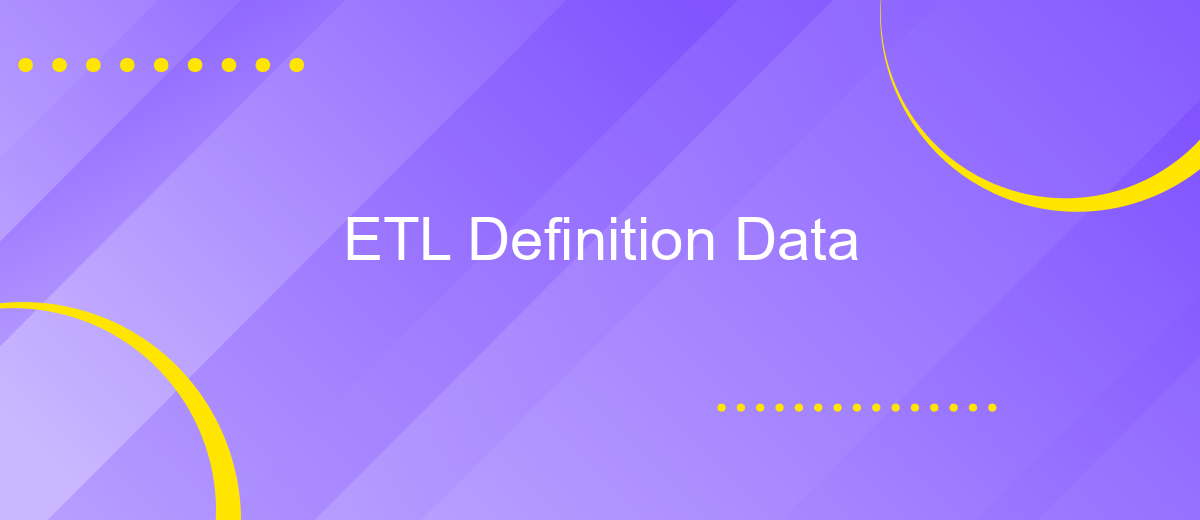ETL Definition Data
ETL, which stands for Extract, Transform, Load, is a crucial process in data management and integration. It involves extracting data from various sources, transforming it into a suitable format, and loading it into a target database or data warehouse. This process ensures that data is accurate, consistent, and ready for analysis, enabling businesses to make informed decisions.
ETL Overview
ETL (Extract, Transform, Load) is a crucial process in data integration and management. It involves extracting data from various sources, transforming it into a suitable format, and loading it into a target database or data warehouse for analysis and reporting. This process ensures that data is accurate, consistent, and ready for business intelligence activities.
- Extract: Data is collected from multiple sources, such as databases, APIs, and flat files.
- Transform: The extracted data is cleaned, formatted, and transformed to meet the requirements of the target system.
- Load: The transformed data is loaded into the target database or data warehouse for further use.
Effective ETL processes are essential for making informed business decisions. Tools like ApiX-Drive can simplify the integration and automation of ETL workflows, enabling seamless data transfer between various systems and applications. By leveraging such services, organizations can ensure their data is up-to-date and accessible, facilitating better analysis and strategy development.
ETL Process

The ETL process, which stands for Extract, Transform, Load, is a fundamental procedure in data integration and management. During the extraction phase, data is collected from various sources such as databases, APIs, and flat files. This data is then transformed to fit the operational needs, which may include data cleaning, normalization, and enrichment. Finally, the transformed data is loaded into a target data warehouse or database, where it can be accessed and analyzed by end-users and applications.
Modern ETL tools and services, such as ApiX-Drive, simplify the integration process by providing automated workflows and real-time data synchronization. ApiX-Drive allows users to connect multiple data sources with minimal coding, ensuring that data is always up-to-date and accurate. This service is particularly useful for businesses looking to streamline their data operations and improve decision-making processes through reliable and efficient data integration.
ETL Tools

ETL tools are essential for efficiently extracting, transforming, and loading data from various sources into a centralized data warehouse. These tools help streamline the data integration process, ensuring data accuracy and consistency across different systems.
- Apache Nifi: A powerful, easy-to-use, and reliable system to process and distribute data.
- Talend: Provides a comprehensive suite of tools for data integration, transformation, and management.
- Informatica PowerCenter: A widely-used data integration tool known for its scalability and performance.
- ApiX-Drive: An intuitive platform that allows users to automate data integration between various applications and services without coding.
- Microsoft SQL Server Integration Services (SSIS): A platform for building enterprise-level data integration and transformation solutions.
Choosing the right ETL tool depends on your specific needs, such as the complexity of data workflows, the volume of data, and the level of automation required. Tools like ApiX-Drive are particularly useful for businesses looking to set up integrations quickly and efficiently, without the need for extensive technical knowledge.
ETL Best Practices

Implementing ETL processes efficiently requires adherence to best practices to ensure data integrity, scalability, and performance. Start by clearly defining your data requirements and mapping out the data flow from source to destination. This helps in identifying potential bottlenecks and ensures a smoother ETL process.
Another crucial aspect is to automate as much of the ETL process as possible. Automation not only reduces the risk of human error but also improves efficiency. Tools like ApiX-Drive can be incredibly useful for setting up and managing integrations between various data sources and destinations, streamlining the entire ETL workflow.
- Ensure data quality by implementing validation checks at each stage of the ETL process.
- Regularly monitor and maintain ETL pipelines to identify and resolve issues promptly.
- Optimize performance by scheduling ETL jobs during off-peak hours.
- Document your ETL processes thoroughly to facilitate easier troubleshooting and updates.
Lastly, consider scalability from the outset. As your data grows, your ETL processes should be able to handle increased loads without significant performance degradation. Periodically review and update your ETL strategies to align with evolving business needs and technological advancements.


ETL Challenges and Solutions
ETL processes often face challenges such as data quality issues, scalability problems, and integration complexities. Ensuring data accuracy and consistency is paramount, yet it can be difficult due to disparate data sources. Scalability is another critical concern, as the volume of data grows, the ETL system must efficiently handle increased loads without compromising performance. Integration complexities arise when connecting various systems, requiring robust solutions to manage diverse data formats and protocols.
To address these challenges, organizations can implement data validation techniques to improve data quality and use scalable cloud-based ETL tools to manage growing data volumes. For integration complexities, services like ApiX-Drive can be invaluable. ApiX-Drive simplifies the integration process by providing a user-friendly platform to connect different applications and automate data workflows, reducing the time and effort needed to manage integrations. By leveraging such tools and best practices, organizations can enhance the efficiency and reliability of their ETL processes.
FAQ
What is ETL in the context of data management?
Why is ETL important for businesses?
What are the main challenges of implementing ETL processes?
How can businesses automate their ETL processes?
What are the typical steps involved in an ETL process?
Apix-Drive is a universal tool that will quickly streamline any workflow, freeing you from routine and possible financial losses. Try ApiX-Drive in action and see how useful it is for you personally. In the meantime, when you are setting up connections between systems, think about where you are investing your free time, because now you will have much more of it.

